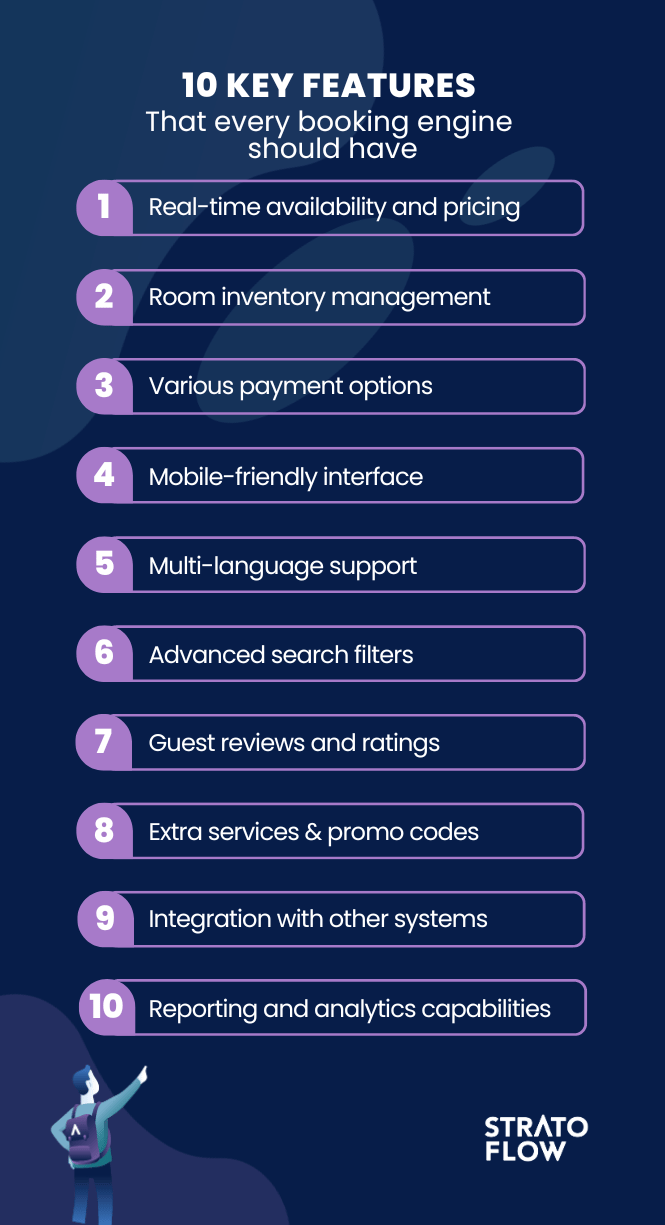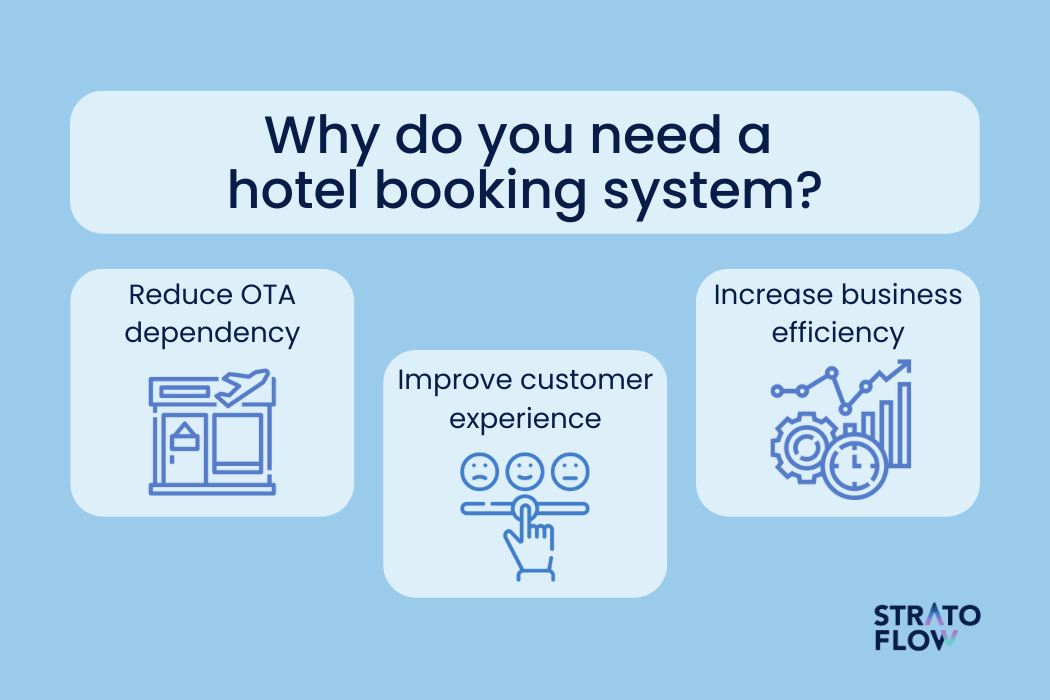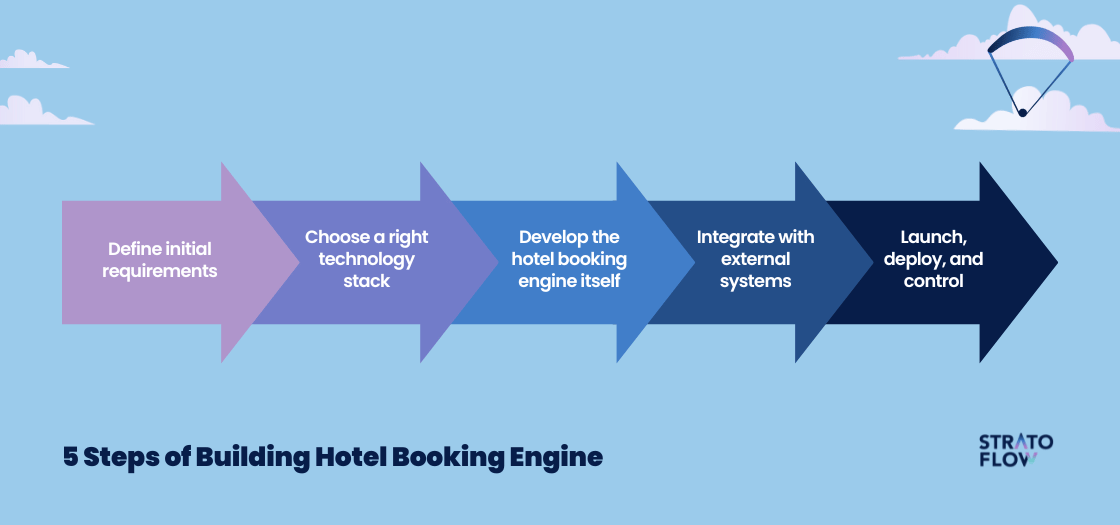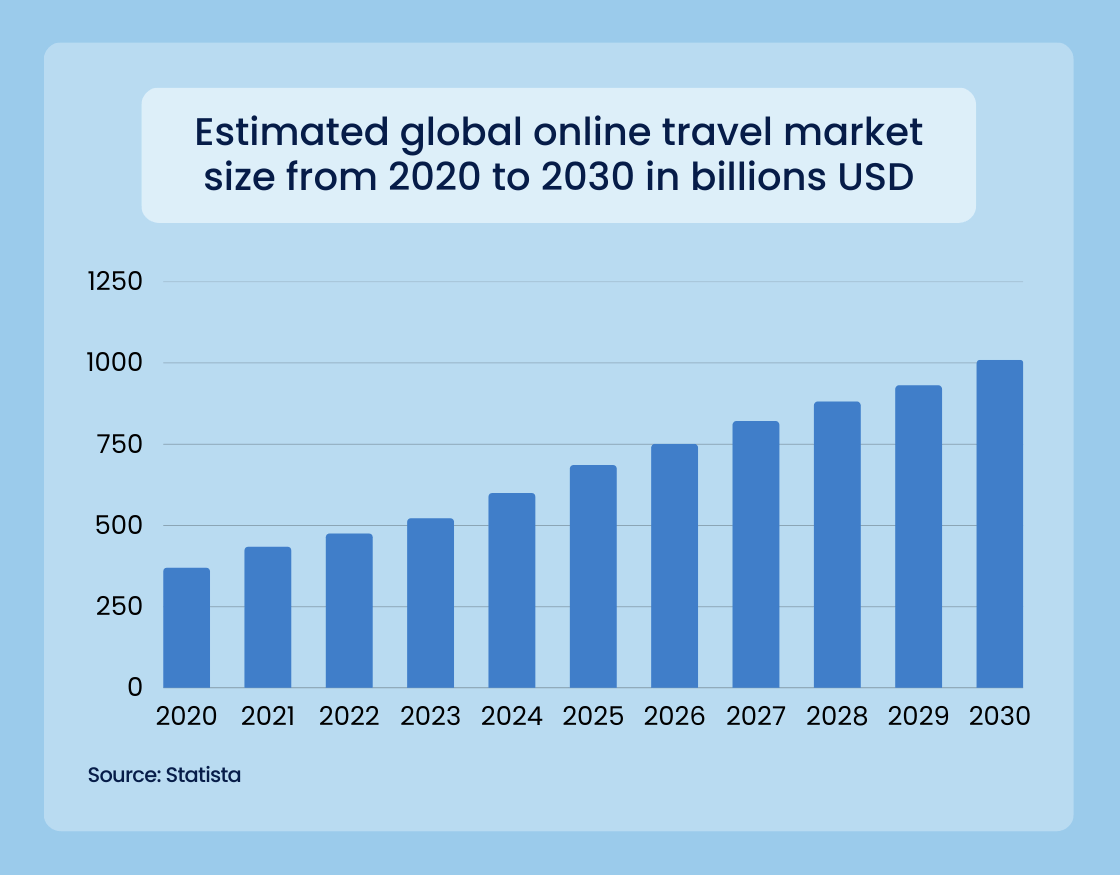
What Is a Booking Engine? Your Practical Guide
Are you tired of relying solely on third-party websites for bookings and missing out on potential revenue?
Enter the booking engine – the ultimate solution for independent hotels and accommodation providers looking to increase direct bookings and take control of their online presence.
In this practical guide, we’ll take a deep dive into the ins and outs of booking engines, how they work, and what it takes to build one from scratch, so hotel owners can make an informed decision about their business. Get ready to discover the power of a booking engine and take your company’s online presence to the next level.
Contents
- What is a booking engine?
- What is a hotel booking engine software?
- How does an online booking engine work?
- Booking engine features
- Why do you need a hotel booking system
- Benefits of a booking engine software
- How to get people to use your booking engine?
- How to create a hotel booking engine?
- How to connect a booking engine with channel managers?
- Top examples of hotel booking engines
- Key statistics about hotel booking engines
- Future of booking engines
What is a booking engine?
Generally speaking, a booking engine is an online software application used by businesses to manage and automate the process of booking various services. It is typically used by companies in the travel and hospitality industry, such as hotels, airlines, car rental companies, and tour operators, but can also be used in other industries such as healthcare, education, and entertainment.
A booking engine allows customers to search for availability and make reservations for a product or service directly from the company’s website. It typically includes features such as real-time availability and pricing, secure payment processing, and confirmation emails.
Booking engines can be integrated with other systems, such as customer relationship management (CRM) software, travel management solutions, inventory and yield management systems, and marketing automation platforms, to provide a seamless and efficient booking experience for customers and businesses alike.

What is a hotel booking engine software?
A hotel booking engine software is a type of booking engine designed specifically for the hotel industry. It is an online reservation system that allows hotels to manage and automate their room inventory, rates, and reservations.
Hotel booking software allows guests to search for room availability, compare room rates, and make reservations directly from the hotel’s website. Booking engine software is typically integrated with the hotel’s property management system (PMS) or hotel channel manager software to ensure real-time inventory management and pricing.
A hotel reservation system typically includes features such as a room availability calendar, room rate management, property descriptions and photos, secure payment processing, and email confirmations. Some hotel booking engine software may also offer additional features such as guest reviews, loyalty program integration, and multi-language support, all in an effort to provide the most seamless user experience possible.
Using hotel booking engine software can help hotels increase their online visibility, improve the booking process for guests, and increase revenue by enabling direct bookings through their website without having to pay fees to an online travel agency.
Using hotel booking engine software can help hotels increase their online visibility, improve the booking process for guests, and increase revenue by enabling direct bookings through their website without having to pay fees to an online travel agency.
How does an online booking engine work?
An online booking engine works by integrating with your hotel’s website and securely processing online reservations, which are then transferred to your property management system for easy management. Additional features such as automated confirmation emails may also be available. The booking engine can also be integrated with a channel manager, allowing it to be operated and managed similarly to online travel agencies.
Booking engine features
Modern booking engines offer a number of features that provide a seamless and user-friendly booking experience for customers, while helping businesses manage their operations more efficiently.
In this section, we’ve prepared a list of the ten most important features of modern booking engines. If you are planning to build your own hotel booking system, you can consider this as your to-do list. Integrate these features into your system and you can be sure that your website will tick all the boxes of modern travel industry software.

1. Real-time availability and pricing
The main advantage of making reservations directly from a hotel’s website is real-time information on availability and pricing.
Booking engines provide real-time updates on exactly what rooms are available, how much they cost, and whether there are any current discounts. All of this ensures accurate information for customers and reduces the risk of overbooking.
2. Room inventory management
In the same way that online booking engines provide valuable information to website visitors, they also offer business owners a much easier way to manage room inventory.
The days of paper notebooks and ad hoc Excel spreadsheets are long gone. Today, advanced booking engines allow hotels to manage their room inventory, including room types, descriptions, and room rates, through a single, powerful software system.
3. Various payment options
In order to compete with large online travel agencies and giant meta-search engines, custom hotel booking systems must offer multiple payment options, such as credit card, debit card, or PayPal. This greatly improves the user experience and reduces the site’s bounce rate, as no potential user will be discouraged by the lack of their preferred payment option.
4. Mobile-friendly interface
Every year, more and more of the world’s online activity takes place on mobile devices.
For the average travel and hospitality company, this means that their custom, modern booking engines must be designed to be mobile-friendly and provide a seamless booking experience for customers, regardless of the type of device they are using.
5. Multi-language support
There’s probably no other industry where you deal with customers from as many different countries as the travel industry.
Booking engines need to support multiple languages so that customers can book rooms in their preferred language. In many countries, the general level of English among citizens is still somewhat lackluster, so it is important not to lose these potential clients.
6. Search filters
When online user visits a hotel’s website, they need to feel as if they are being served by a polite and well-trained assistant.
How is this possible?
Hotels need to design their booking engines so that their search engines are intuitive, simple, and easy to use. Using technology such as AI-powered recommendations, customers can quickly browse available rooms based on a variety of different criteria such as price, room amenities, and location.
7. Guest reviews and ratings
Perhaps the most powerful marketing and advertising tool is social proof.
Customers are much more likely to trust a brand or company if its products are backed by positive and verified user reviews. This is why many modern booking engines allow guests to leave reviews and ratings, which can help other customers make informed decisions and improve the reputation of the hotel.
8. Extra services & promo codes
One of the biggest advantages of direct booking is the fact that users tend to get more attractive rates on a hotel’s website due to the lack of mandatory OTA fees.
Why not capitalize on this opportunity by offering additional services and promo codes? With a custom hotel booking engine, organizations can run limited-time promotions that play to people’s FOMO. They can also offer additional services, such as extra flexibility in user reservations, that popular metasearch engines simply can’t provide.
9. Integration with other systems
Booking engines can also integrate with other systems such as property management systems (PMS), customer relationship management (CRM) software, and marketing automation platforms. All of this adds another layer of valuable information for hotel owners to use to further optimize their business.
10. Reporting and analytics capabilities
Last but not least is analytics.
Modern booking engines offer excellent, robust reporting and analytics that allow businesses to track key metrics such as booking trends, revenue, and occupancy rates. This information can help businesses make data-driven decisions and optimize their operations to a degree that is simply impossible when relying solely on external services like Booking.com or Airbnb.
[Read also: Hotel Inventory Management 101: An Introduction]
Why do you need a hotel booking system
Alright, we’ve already established that a custom online booking engine offers many unique features that are beneficial to online users and online entrepreneurs alike.
But is it all worth the effort? After all, developing, integrating and deploying this long list of features will undoubtedly be a massive challenge in and of itself. But trust us, it will be worth it in the long run. Let’s look at three main reasons why you need a custom hotel booking engine.

Reduce OTA Dependency
Modern OTAs and major metasearch engines offer hotel chains a great way to reach a huge pool of potential customers quickly and efficiently.
Unfortunately, there’s one big caveat – their fees.
Many major travel aggregators, such as Booking.com and Airbnb, charge around 15% commission per reservation. Many end users simply do not realize this when comparing prices between competing hotels in a given area.
By using a custom booking engine, you can offer customers almost the same level of convenience as online travel agencies (OTAs). When customers make direct reservations through your website, it results in a higher number of direct bookings and reduces the amount of commissions paid to OTAs, making direct bookings from the hotel website much more competitive.
Improve customer experience
Modern hotel booking engines can significantly improve the user experience by providing real-time access to room availability and rates, allowing users to book and confirm their reservations instantly.
These booking engines also offer personalized recommendations based on the user’s search history and preferences, making it easier for them to find the perfect room. In addition, many booking engines offer secure payment processing and a variety of payment options, giving users peace of mind and making the booking process more convenient.
Some booking engines even allow users to check in and out digitally, further enhancing the overall user experience. All of these features work together to create a seamless, hassle-free booking experience that improves customer satisfaction and encourages repeat bookings.
[Read also: Digital Transformation in the Travel and Tourism Industry]
Increase business efficiency
A general rule of thumb in business is that a happy customer means more revenue for the business itself.
The online travel and hospitality industry is no different.
A better customer experience will inadvertently translate into better business metrics and KPIs. What’s more, modern hotel booking systems have the potential to significantly increase business efficiency and revenue by automating many of the manual tasks that were previously time-consuming and labor-intensive.
By streamlining the booking process, these systems can free up staff time to focus on other important tasks such as guest service and marketing. In addition, advanced booking systems can provide valuable insights into customer behavior and preferences that can be used to inform hotel revenue management strategies and marketing campaigns. By optimizing pricing and marketing strategies, hotels can attract more bookings and generate more revenue.

Benefits of a booking engine software
Alright, we’ve already established three main reasons why a modern hotel booking engine is a must for hotel chains and other companies in the travel industry. Now, let’s take a closer look at exactly how a customized hotel reservation system can benefit organizations in this vibrant industry.

Increased revenue and business efficiency
As we’ve mentioned before, custom booking engine software can help businesses increase revenue by enabling direct bookings through their website, eliminating the need for third-party booking sites and reducing commission fees.
Booking engine software can also automate the booking process, reducing the need for manual tasks such as managing reservations, room inventory, and rates. This improves efficiency and frees up staff time to focus on other important tasks.
Enhanced customer experience
These days, customers won’t wait for a website to load. With so much competition in the market, users are much more likely to look elsewhere for the product or service they need, rather than wait for an outdated and bulky website to load.
Powerful booking engine software can provide customers with a seamless and user-friendly booking experience. Customers can easily search for availability, compare rates, and make reservations directly from the company’s website. Lean software architecture can dramatically improve latency and load speed, resulting in a customer experience superior to even the most established OTAs on the market.
Real-time availability and increased flexibility
The biggest benefit from the user’s perspective is that an online booking system can provide them with real-time updates on room availability and pricing, ensuring accurate information and reducing the risk of overbooking.
This is also a great benefit for the businesses themselves, as it gives them greater flexibility to manage their bookings and inventory from anywhere, as long as there is an Internet connection. This can be particularly useful for businesses with multiple locations or remote teams.
Data Analysis and Insights
Finally, booking engine software can provide businesses with valuable data and insights into customer behavior, booking trends, and revenue performance. This information can be critical for businesses to make data-driven decisions and optimize their operations.
How to get people to use your booking engine?
Getting ordinary users to use your custom hotel reservation system can be a bit tricky.
These days, people are used to opening popular travel aggregators and scrolling through countless offers from different providers, comparing them and looking for the best deal possible.
Hotel websites, therefore, have a large and well-established competition in this market.
To get people to use your hotel booking engine, you need to make sure it is easy to use, visually appealing and offers competitive pricing. Make sure it supports multiple languages and currencies. You can also consider using some attractive promo codes to retain a stable user base and running Google Hotel Ads to attract brand-new customers.
To drive traffic to your booking engine, invest in search engine optimization, social media marketing, and email campaigns that promote your direct booking channel. By focusing on user experience, competitive pricing, and effective marketing strategies, you can increase direct bookings through your hotel booking engine and drive revenue growth.
How to create a hotel booking engine?
Building a hotel booking engine is in many ways similar to other software development processes. It requires a certain level of expertise in programming, software architecture, web design, and database management.
Because a modern booking engine must serve hundreds or even thousands of concurrent users, it needs to be designed to work flawlessly even under significant load. Here are some general steps that can be followed to create a high-performance hotel booking engine.

Define initial requirements
Define the requirements for the booking engine, such as desired functionalities, features, UI elements, and necessary integrations. This will help you identify the technology stack and tools required for the project.
The list of booking engine features can act as a broad list of general functionalities that your future software solution should include.
Choose a right technology stack
Choose the technology stack, such as the programming language, framework, and database, based on the project requirements.
Since booking engines deal with large amounts of data and a significant number of users, make sure that the technology stack you choose will be able to handle all this load. It is best to choose something lean and lightweight like modern Java and base your architecture on a multi-tenant database approach so that your system can be easily expanded vertically in the future.
[Read also: Travel Technology Trends]
Develop the booking engine itself
Now it’s time to work on the engine software itself, including the user interface, search functionality, room inventory management, pricing, and payment processing.
As you develop your software system, choose an agile and iterative approach and have your development team work in short sprints to make sure everything is on track according to the project roadmap. Remember all the good programming practices to ensure that your final product is built to the latest software standards.
If you are not sure if you have the necessary knowledge and experience to embark on this journey on your own, you can always seek the help of experts. An experienced custom software development company can help you with every step of the software development process, from establishing preliminary requirements to testing and deployment.
Integrate with External Systems
No system is as effective as it can be if it’s isolated from the rest of the software architecture.
That’s why it’s imperative to integrate the booking engine with external systems such as the hotel’s property management system (PMS), customer relationship management (CRM) software, and payment gateway. By doing so, you can take full advantage of insightful data from every step of the customer journey.
Launch, deploy, and control
Once the booking engine is developed and tested, deploy it to the server and launch it on the website.
Remember that software development is a continuous and iterative process. After the final deployment, use one of the many website performance metrics to verify that the software is performing as expected.

How to connect a booking engine with channel managers?
Connecting a booking engine to a channel manager can be a complex process, but it is essential for hotels as these two software tools are closely related.
The first step is to make sure that both the booking engine and the hotel channel manager are compatible and can integrate with each other. Once you have set up accounts for both systems, you will need to configure the settings and details for your property. This includes setting up room types, rates, availability, and other details. The next step is to connect the booking engine to the channel manager, preferably using an API, but other integration methods can also be used.
This will allow the booking engine to communicate with the channel manager and update availability and pricing information in real-time. Finally, you should test the connection to ensure that all data is transferred accurately. By connecting a booking engine with a channel manager, you can manage your online bookings and availability from a single platform and streamline your operations.
Top examples of hotel booking engines
What is the best hotel booking engine on the market today?
There’s no simple answer to this question.
There are many examples of hotel booking engines on the market, each with its own unique features and capabilities. Each has a slightly unique way of presenting information to users and marketing strategies. Each has a completely different software architecture behind it. Here are five of the most popular examples:
- Booking.com – It’s not really a bespoke hotel booking system but rather a massive OTA with a powerful travel metasearch booking engine that allows users to browse through thousands of offers from a given area of the world. Hotels on the other hand can manage their own inventory and prices, as well as offer special promotions and discounts.
- Expedia – It is yet another major OTA with a comprehensive booking engine that allows hotels to manage their own rates and inventory, as well as offer add-on services like airport transfers and tours.
- Marriott International – Marriott’s hotel booking engine is a prime example of a robust and user-friendly platform that allows guests to easily search for and book rooms at any of the company’s thousands of properties worldwide. The booking engine is integrated with Marriott’s loyalty program, Marriott Bonvoy, which offers exclusive member rates and benefits, as well as the company’s property management system, allowing for real-time updates to pricing and availability.
- Hilton Worldwide – Hilton’s system is a powerful and easy-to-use platform that allows guests to book rooms at any of the company’s properties across the globe. Their booking engine, just like Marriott’s, is also integrated with Hilton’s loyalty program, Hilton Honors, which offers members exclusive rates and benefits, as well as with the company’s property management system. The booking engine also offers personalized recommendations based on a guest’s past booking history and loyalty program status. Guests can securely book and manage reservations online or through Hilton’s mobile app, which offers additional features such as digital check-in and room selection.
- InterContinental Hotels Group – IHG offers a user-friendly hotel booking engine that allows guests to book rooms directly on their website. The booking engine is designed to be simple and intuitive, making it easy for guests to search for hotels based on their destination, travel dates, and other preferences. One of the key features of the IHG booking engine is its Best Price Guarantee, which assures guests that they are getting the best available rate when they book directly on the hotel’s website. The booking engine also offers a range of promotional rates, packages, and discounts, as well as the option to earn and redeem IHG Rewards Club points. The InterContinental booking engine is fully responsive, meaning it can be accessed from any device, including desktops, laptops, tablets, and mobile phones.
Key statistics about hotel booking engines
The online travel industry is absolutely massive and hotel booking engines play a vital role in its operation.
According to Statista, the size of the online travel market in 2022 has seen a significant increase compared to the previous year. It is estimated that the global online market was worth around $475 billion in 2022. We can be sure that this year these figures will only continue to grow. According to the latest projections, the online travel industry will exceed $521 billion in 2023 and grow to over $1 trillion by 2030.
Looking at the travel market as a whole, the online aspect will continue to play a pivotal role that will only grow in the coming years. By 2026, it is estimated that 73% of travel and tourism revenues will be generated online.

Let’s take a look at the importance of hotel booking systems and their role in the modern online travel industry.
A study by Fuel Travel found that 87% of travelers use an online travel agency (OTA) to book their hotel stay, while only 13% book directly on the hotel’s website. At first glance, these numbers don’t seem promising. It appears that the vast majority of online users still prefer the convenience of a major metasearch engine.
However, direct hotel bookings are on the rise. According to a report by SiteMinder, direct bookings have increased by almost 80% between 2016 and 2020. This means that the popularity of hotel booking systems is growing at an average rate of almost 20% per year – a huge untapped potential for travel companies.
These statistics demonstrate the growing importance of hotel booking engines in the travel industry and the increasing trend towards direct bookings as travelers become more aware of the benefits of booking directly with the hotel rather than with a major OTA.

Future of booking engines
What does the future hold for booking engines and their role in the online travel industry? Only time will tell.
What is certain is that as technology advances and customer expectations change, future booking engines will likely include more personalized features, greater use of artificial intelligence, integration with voice assistants, improved mobile functionality, and enhanced security and privacy.
Booking engines will use more personalized features, such as recommendations based on previous bookings or search history. With the use of artificial intelligence, booking engines will be able to better predict customer behavior and preferences, enabling more targeted marketing and personalized experiences. As voice assistants become more common, booking engines may need to integrate with these devices to allow customers to make reservations using voice commands.
In addition, as the majority of online bookings now occur on mobile devices, companies developing booking engines may need to focus more on improving mobile functionality, such as mobile-friendly interfaces and seamless mobile payments. Finally, in light of data breaches and privacy concerns, booking engines will need to prioritize security and privacy features to protect customer data and maintain trust.
Hotel booking engines – closing thoughts
A booking engine is an essential tool for hotels looking to streamline the booking process and increase direct bookings.
With the right booking engine in place, hotels can offer their customers a seamless and convenient booking experience while improving their own operational efficiency.
From real-time availability to personalized recommendations and secure online payments, booking engines offer a range of benefits for both hotels and their guests. As technology continues to advance, the future of booking engines looks promising, with increased personalization, artificial intelligence, and mobile functionality likely to be key developments.
Overall, a booking engine is a critical investment for any hotel looking to remain competitive in the ever-evolving travel industry.
Related Posts
We are Stratoflow, a custom travel software development company. We firmly believe that software craftsmanship, collaboration and effective communication is key in delivering complex software projects. This allows us to build advanced high-performance Java applications capable of processing vast amounts of data in a short time. We also provide our clients with an option to outsource and hire Java developers to extend their teams with experienced professionals. As a result, our Java software development services contribute to our clients’ business growth. We specialize in building bespoke travel solutions like fast search engines, metasearch engines, booking engine services or channel manager integrations.